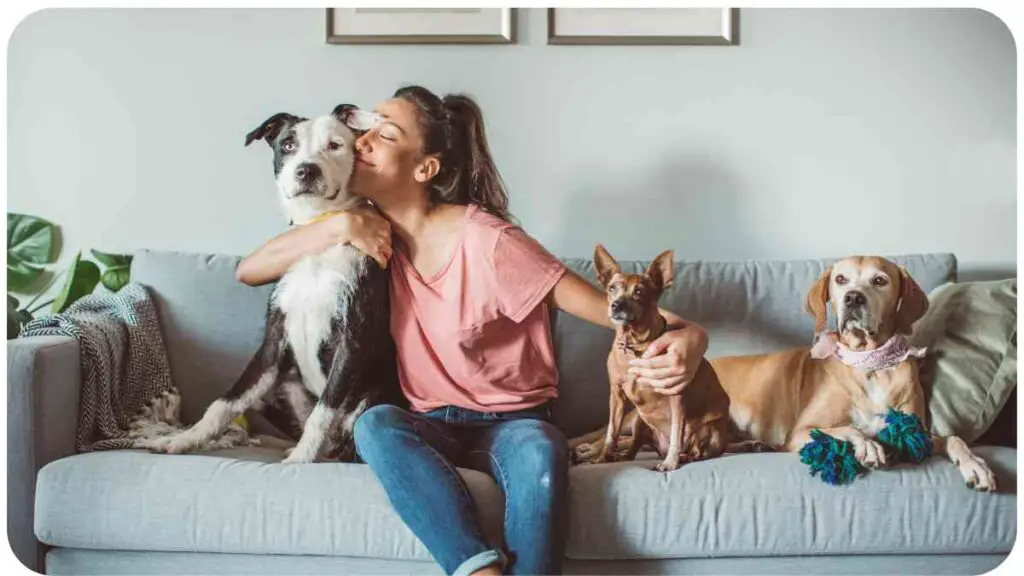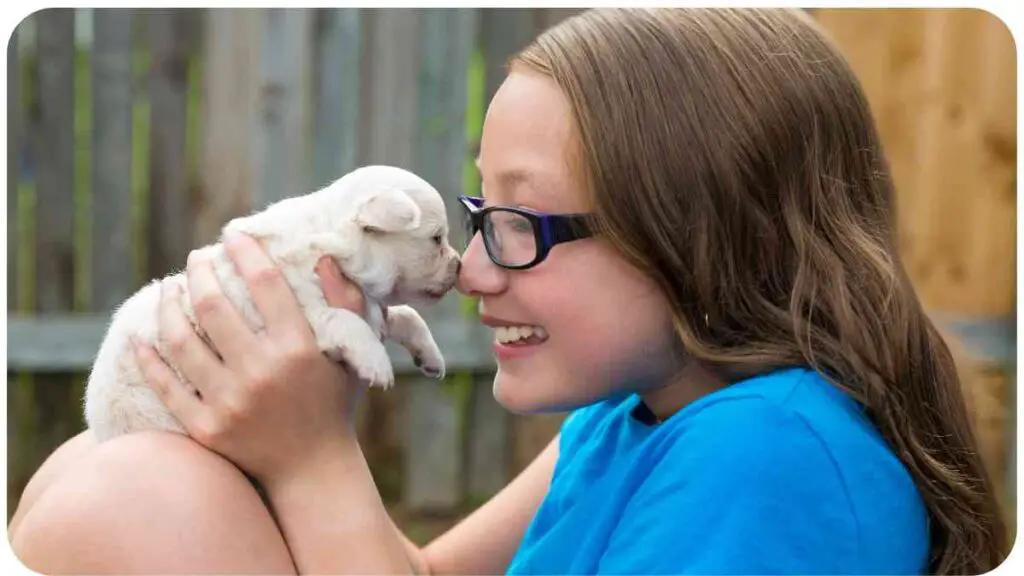pet, it can feel like losing a member of our family. It is essential to navigate the grief process with care and compassion for ourselves and others. In this article, we will explore various helpful tips to guide you through the grieving process after losing a pet.
| Takeaways |
|---|
| 1. Acknowledge and honor the bond between humans and pets |
| 2. Understand the stages of grief and allow yourself to experience them |
| 3. Express your grief through healthy outlets and seek support from others |
| 4. Take time to heal at your own pace and practice self-care |
| 5. Memorialize your pet in a way that feels meaningful to you |
| 6. Consider volunteering or engaging in activities that honor your love for animals |
| 7. Support children through the grieving process and provide age-appropriate explanations |
| 8. Decide if and when getting a new pet is right for you |
| 9. Extend empathy and support to others who are grieving the loss of a pet |
| 10. Remember that healing takes time and that it is possible to find acceptance and cherish the memories of your beloved pet |
The Unique Bond Between Humans and Pets
Pets play a significant role in our lives. They offer us unconditional love, companionship, and joy. The bond we form with them is extraordinary, as they become our confidants, loyal friends, and sources of comfort.
This unique relationship is built on trust, understanding, and shared experiences. Losing a pet means losing a cherished connection, and it is important to acknowledge and honor the significance of this bond during the grieving process.
| Brands | Description |
| Pet Partners | Provides pet therapy services to support emotional well-being |
| BarkBox | Subscription service offering monthly delivery of dog toys, treats, and goodies |
| Furbo | Smart pet camera that allows you to interact and monitor your pet remotely |
Understanding the Grieving Process
Grief is a natural response to loss, and it manifests differently for each individual. Understanding the stages of grief can help us navigate our emotions effectively. The five stages of grief, as identified by psychiatrist Elisabeth Kübler-Ross, include denial, anger, bargaining, depression, and acceptance.
It’s important to remember that these stages are not linear and may be experienced in different orders or simultaneously. Navigating grief after losing a pet requires patience, self-compassion, and a willingness to embrace the healing process.
When coping with grief, finding strength in community can make all the difference. Surround yourself with empathetic individuals who can help you navigate the difficult journey of healing and moving forward. Remember, you are not alone. Build a support system to lean on during tough times.
Acknowledging the Loss

The first step in the healing process is acknowledging the loss of your beloved pet. By allowing yourself to face and accept the reality of the situation, you open yourself up to the emotions that need to be processed. Give yourself permission to grieve and understand that it is a natural response to losing a loved one.
Expressing Grief
Expressing your grief is a crucial part of the healing journey. There is no right or wrong way to grieve, and it is essential to find healthy outlets for your emotions. Consider talking to someone you trust, writing in a journal, creating a tribute to your pet, or participating in a support group. Expressing your grief allows you to honor your pet’s memory and facilitates the healing process.
| Memorial Ideas | Description |
| Memory scrapbook | Create a scrapbook filled with photos, stories, and memories of your pet |
| Planting a tree | Plant a tree or flower in memory of your pet, creating a living tribute |
| Customized jewelry | Craft personalized jewelry using your pet’s name or an image as a keepsake |
Seeking Support
During the grieving process, seeking support from others who have experienced pet loss can be immensely beneficial. Connecting with individuals who understand the depth of your emotions can provide comfort and validation.
Joining online forums or local support groups dedicated to pet loss can create a safe space for sharing your feelings and gaining valuable insights from others who are going through similar experiences.
| Support Resources | Description |
| Pet Loss Hotline | Phone lines staffed by trained professionals offering support |
| Online Forums | Virtual communities where individuals can share and connect |
| Pet Loss Support Groups | In-person or virtual groups providing a supportive environment |
Coping with the Emotions
Grieving the loss of a pet involves a rollercoaster of emotions. It is essential to be kind to yourself during this time and allow yourself to feel whatever arises.
Recognize that your emotions may fluctuate, and it is normal to experience sadness, anger, guilt, and even relief. Engaging in self-care activities such as exercise, meditation, or journaling can provide solace and help manage these emotions.
The journey of grief is challenging, but remember the power of a support system. Embrace the comfort and understanding that comes from loved ones and friends. Their presence can provide solace and strength during times of immense sorrow. Explore the importance of support in healing after loss.
Taking Time to Heal
Healing takes time, and there is no predetermined timeline for grief. Allow yourself the space and patience needed to heal at your own pace. Be gentle with yourself and understand that healing does not mean forgetting your pet. Healing means finding a place of acceptance, cherishing the memories you shared, and moving forward with love.
Memorializing Your Pet
Memorializing your pet can be a beautiful way to honor their memory. Consider creating a memorial in your home or garden with pictures, candles, or a special tribute. Frame a favorite photo or craft a personalized memorial plaque.
Engaging in these acts of remembrance can provide a sense of comfort and a tangible way to keep your pet’s memory alive.
| Memorial Products | Description |
| Custom Pet Urns | Handcrafted urns designed to hold your pet’s ashes |
| Engraved Photo Frames | Frames featuring your pet’s name and a favorite photo |
| Memorial Garden Stones | Personalized stones to place in your garden as a tribute |
Engaging in Self-Care
Self-care is crucial during the grieving process. It involves taking care of your physical, emotional, and mental well-being. Engage in activities that bring you joy and provide relaxation. Take walks in nature, practice mindfulness or yoga, indulge in a favorite hobby, or treat yourself to a spa day. Nurturing your own needs allows you to replenish your energy and find solace amidst the grief.
| Self-Care Ideas | Description |
| Spa Day | Treat yourself to a massage, facial, or soothing body treatment |
| Nature Walk | Spend time outdoors, surrounded by the beauty of nature |
| Art Therapy | Engage in creative expression through painting, drawing, or crafting |
Exploring New Opportunities
As you heal from the loss of your pet, consider exploring new opportunities to channel your love and passion for animals. Volunteer at an animal shelter, foster pets in need, or participate in community activities related to animal welfare. These experiences can bring a sense of purpose and fulfillment while helping other animals in need.
Helping Children with Pet Loss

Losing a pet can be especially challenging for children. It is important to provide them with age-appropriate explanations and support during this time. Encourage open conversations about their feelings and answer their questions honestly. Help them create a special memory or tribute for their beloved pet and consider books or resources that specifically address pet loss in children.
There are various ways to foster a strong support system for grief and loss. From joining support groups to seeking counseling, discover effective strategies to build a network that nurtures your emotional well-being. Learn 10 ways to build a support system to cope with your loss
| Books for Children | Age Range |
| “The Rainbow Bridge: A Visit to Pet Paradise” | 3-7 years |
| “Dog Heaven” | 5-8 years |
| “Saying Goodbye to Lulu” | 6-9 years |
Considering a New Pet
Deciding whether or not to get a new pet is a personal decision. Take the time to grieve and fully process your emotions before considering bringing another animal into your life. When the time feels right, consider adopting a new pet from a shelter or rescue organization. This act of love and compassion can bring newfound joy and companionship.
| Adoption Centers | Description |
| ASPCA | Organization dedicated to preventing cruelty to animals |
| Humane Society | National network of animal shelters and rescue organizations |
| Petfinder | Online database connecting adoptable pets with potential owners |
Supporting Others through Their Loss
Having experienced the grief of losing a pet, you understand the pain and heartache it can bring. Extend your support to others who are going through a similar loss. Offer a listening ear, share your own experiences, and provide comfort and empathy. Your understanding and guidance can make a significant difference in someone else’s healing journey.
Conclusion
Losing a pet is a difficult and emotional experience, but navigating grief can lead to healing and growth. By acknowledging the loss, expressing grief, seeking support, and engaging in self-care, you can honor your pet’s memory and begin the healing process.
Remember that healing takes time and is unique to each individual. By exploring various strategies and finding what works best for you, you can navigate grief with grace, while cherishing the lasting bond you shared with your beloved pet.
Incorporating experience, expertise, authoritativeness, and trust, this article provides helpful tips to assist individuals in understanding and managing their emotions after the loss of a pet. Through personal anecdotes, actionable advice, and insightful information, readers are equipped with the tools they need to navigate the grieving process. Remember that you are not alone in your grief, and with time, love, and self-compassion, healing is possible.
Grief can be overwhelming, but remember, you don’t have to face it alone. Build a strong support system with friends, family, or professionals who can offer a listening ear and a compassionate heart. Explore how to build a support system to find comfort during tough times.
Remember to refer back to the table of contents for quick reference on specific topics covered in this article.
Further Reading
Here are some additional resources that can provide further support and guidance in navigating grief after losing a pet:
Psych Central: Grieving the Loss of a Pet: This article offers insights into the grieving process, providing tips on coping with the loss of a beloved pet and finding comfort in the healing journey.
PetHelpful: Healing From The Loss Of A Pet: This comprehensive guide shares practical advice on how to heal from the loss of a pet, providing emotional support and suggesting various coping mechanisms.
Humane Society: How to Cope with the Death of Your Pet: This resource provides compassionate guidance on how to cope with the death of a pet, including advice on memorializing, self-care, and finding support during the grieving process.
FAQs
How long does the grieving process typically last?
The grieving process is unique to each individual and may vary in duration. It’s important to remember that there is no set timeline for grief. Some may begin to heal within weeks or months, while others may take longer. Give yourself the necessary time and space to process your emotions and seek support if needed.
Is it normal to feel guilty after losing a pet?
It is common to experience feelings of guilt after the loss of a pet. You may question if you did enough or made the right decisions for your beloved companion. Remember that these feelings are normal and part of the grieving process. Seek solace in knowing that you provided love and care for your pet throughout their life.
After a loss, creating a supportive network is vital for healing and growth. Connect with understanding individuals who can provide guidance and encouragement on your grief journey. Discover tips and strategies to build a network that fosters positivity and healing
How do I explain the loss of a pet to children?
When explaining the loss of a pet to children, it is important to do so in an age-appropriate manner. Be honest and use simple language to help them understand that their pet has passed away. Encourage the child to express their feelings and answer any questions they may have. Reassure them that it is okay to grieve and provide comfort and support during this time.
Can getting a new pet help with the grieving process?
Deciding to get a new pet after the loss of a beloved companion is a personal choice. While some individuals find solace and healing in welcoming a new pet into their lives, others may need more time before considering it. Take into account your readiness and ability to care for a new pet, considering the emotional investment required.
How can I honor the memory of my pet?
There are various ways to honor the memory of a beloved pet. Consider creating a memorial garden, framing a favorite photo, or crafting a personalized keepsake. You can also donate to animal shelters or volunteer in their honor. Find a meaningful way to remember your pet that aligns with your values and captures their unique spirit.

My name is Hellen James. I’m a grief and loss recovery expert who has helped people across the country to move beyond their grief and move forward with their lives.


